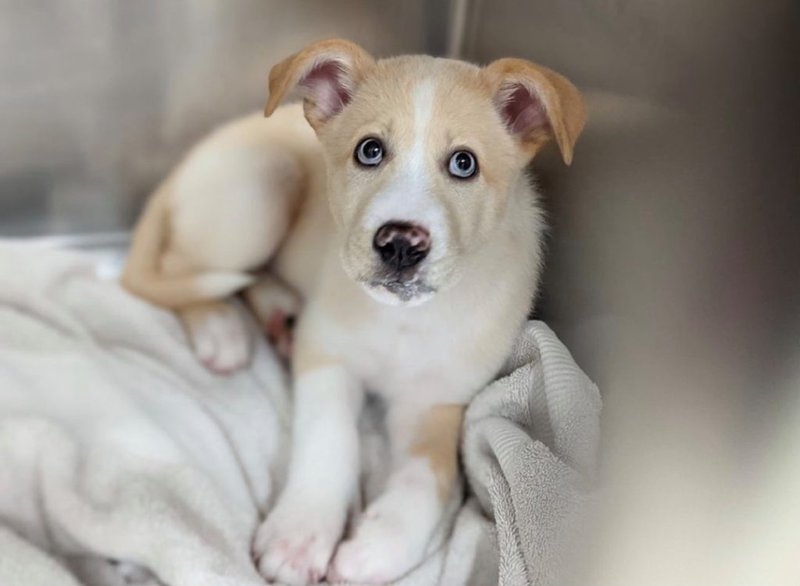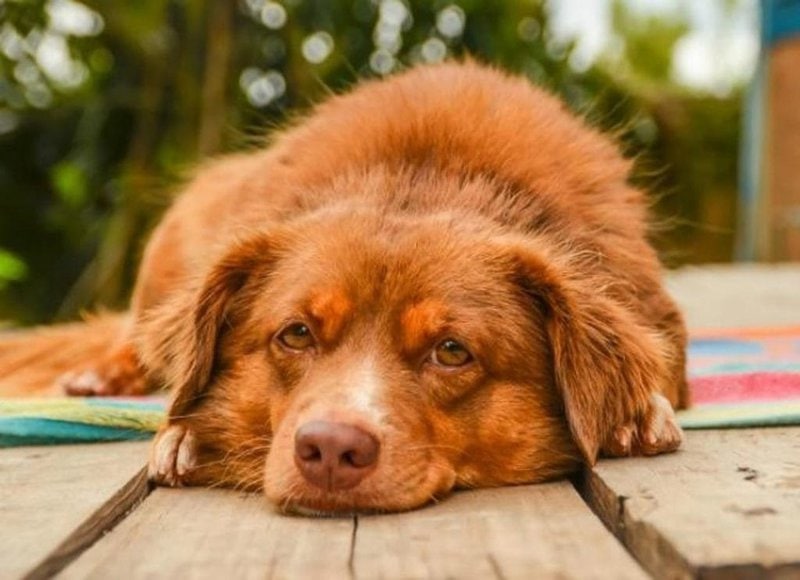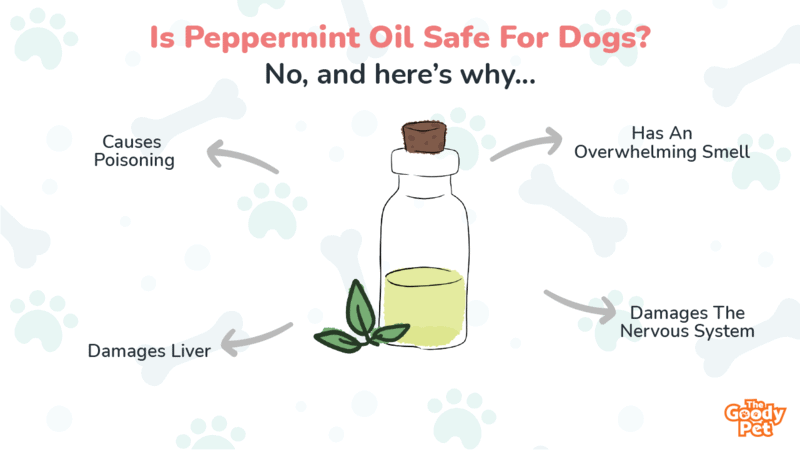A peppermint herb is a cross between water mint and spearmint, the taste and smell of which you are surely familiar with. And because of the high menthol content in peppermint, oil is often extracted from the leaves. Combined with the mild sweetness and the sharp odor, it is no wonder that peppermint oil is widely used to flavor gums, toothpaste and tea, just to name a few.
Aside from its use as a common additive in many of our household products, peppermint oil is also used as an aromatherapy oil. We are all in love with the aromatics and the refreshing smell of peppermint oil. While diffusing the oil for our pleasure, this, however, poses a question on safety in a household with pet dogs that have a strong sense of smell.
That is exactly what we will talk about today, the 3 ways how your dog can be exposed to essential oils like peppermint and what are the risks involved. We’ll open the article by talking about the health hazards if your dog inhales the oil, followed by the consequences of directly applying the oil to your pet. Lastly, we’ll close the article by sharing information about what happens if your fido orally ingested peppermint oil.
Is Peppermint Oil Safe To Diffuse Around Dogs?
Perhaps you’ve read stories about the benefits of adding peppermint oil in the diffuser and the wonderful effects this can have on your quality of sleep and relaxation. By sharing a home with a fur baby and having it by your side, you may need to reconsider using diffused peppermint oil.
Sorry to disappoint you, but it is not safe at all to diffuse peppermint oil around your dog because the smell is likely to overwhelm your fur baby who has a very strong sense of smell.
In addition, inhaling peppermint oil can result in respiratory issues because the tiny airborne particles can irritate your dog’s respiratory system. Your dog may also suffer from aspiration pneumonia.
In this section, we’d focus on the danger of inhaling peppermint oil and the risks of using active and passive oil diffusers.
Inhaling Peppermint Oil
The sense of smell of your dog is 50 times more powerful than yours. As a brief comparison, your dog has 300 million olfactory receptors compared to you that only have 6 million. So, the smell of peppermint oil may be relaxing and mild for you, but it is not the case with your fido.
Diffused essential oil is too overwhelming for your fur baby and that is why you may see it staying away from a room that smells of diffused peppermint essential oil.
One way to determine if your four-legged baby is bothered by the smell is when you notice if it wiggles its nose and starts to sneeze.
Active Diffuser
There are 2 types of diffusers and if you are using the active diffuser, you may ask if it is safer to use around your dog. Examples of active diffusers are ultrasonic and nebulizing diffusers.
An active diffuser is not 100% safe because it emits particles of peppermint oil into the air through its light mist. The mist can land on your dog’s coat and sleeping area, making your fido susceptible to ingesting these tiny particles that are found to be toxic as explained in the subsequent sections.
In the same manner that inhaling the diffused particles for a long period of time may cause aspiration pneumonia. The symptoms include breathing and swallowing difficulties, as well as rapid breathing.
Passive Diffuser
The simple example of a passive oil diffuser is a candle with an open flame, or a diffuser based on the application of heat.
Actually, it does not get any safer as you know how dogs have a tendency to lick just about anything. There is a high chance that your dog will lick the spills of peppermint oil and suffer from tongue and skin burns, on top of the toxicity introduced by the chemical components of the diffuser.

Why Is Peppermint Oil Bad For Dogs?
Peppermint oil is bad for your dog because it contains chemicals that can be absorbed by the skin. Many of these chemicals present in essential oils, such as derivatives of ketones, phenols and alcohol, are often synthesized in your dog’s liver, leading to a severe case of poisoning in which fatality may ensue.
Puppies and adult dogs, which have pre-existing liver illnesses and issues, are likely to be more vulnerable to the harmful effects of peppermint oil.
Although exposure to trace amounts of peppermint oil may only cause a mild gastrointestinal problem, some of the concentrated oils can have a serious effect on both the liver and the nervous system of the dogs.
Let’s learn more about the hazards of directly applying peppermint oil onto the skin of your dog. We’ll also touch on the use of liquid potpourri and if it is bad for your dog.
Hazards Of Topical Application Of Peppermint Oil
A lot of pet care products in the market today contain trace substances of the essential oils that are used in aromatherapy for humans. But, that does not mean that these essential oils can be used indiscriminately on your fido.
The essential oils used in pet care products are often diluted in small amounts. For example, the natural and organic flea shampoos may contain peppermint oil, but since the oil is diluted with other ingredients, it is generally safe to be used on your dog, provided that you follow the instructions.
For this reason, do not attempt to purchase a bottle of peppermint oil and then apply it directly to the skin of your pet. The compound present in the volatile oil, like peppermint, can be absorbed through the skin and enter the bloodstream of your fur baby. As mentioned earlier, a seemingly safe action can actually damage the liver of your pet dog.
Negative Effects Of Liquid Potpourri
You should never use liquid potpourri on your dog. Liquid or oil peppermint potpourri is the aromatic alternative to dried petals and spices. Similar to essential oils, liquid potpourri is also made by using a cationic detergent.
This detergent is too strong for your fur baby and when exposed, can cause chemical burns on its skin and mouth. Plus, we all know how dogs tend to lick on just about anything. In this case, do not discount the possibility that your dog can ingest the oil as it will most likely lick the oil off from its skin.
If your fido accidentally comes in contact with peppermint liquid potpourri, bathe your dog thoroughly until you can no longer smell the peppermint oil.

What Happens If My Dog Eats Peppermint Oil?
Another danger of peppermint oil is oral ingestion. This is definitely a no-no because the compounds that are present in the essential oil can cause chemical burns in the mouth and in the esophagus and the more severe side-effect is poisoning.
In this last section of the article, we’ll enumerate the symptoms of toxicity from eating or licking peppermint oil, as well as the steps you can take if you suspect that your dog is poisoned from the oil. You may also be interested to know about the likelihood of recovery for dogs being poisoned.
Symptoms Of Poisoning
For a lot of dogs, the signs of peppermint oil poisoning are the following:
If you see any of these signs, take your beloved fido to the vet as soon as possible. Time is of the essence when it comes to poisoning and the quicker your response is, the higher the chance that your dog will survive.
Steps You Can Take If You Suspect That Your Dog Is Poisoned
If the peppermint oil was inhaled, the first course of action is to bring your dog outdoors, to be as far away as possible from the smell of peppermint oil.
If the peppermint oil gets on the skin, wash the fur as quickly as possible by using hand-safe dishwashing soap and with copious amounts of water.
If the peppermint oil is ingested, do not try to induce vomiting by giving it inactivated charcoal. This will only put your dog at a greater risk. In this case, the veterinarian will assess the liver and the kidney through blood samplings.
Aggressive treatments in the form of IV fluid, tube feeding, and stomach protectant medicines will be applied to save the life of a poisoned dog.
Likelihood Of Recovery
Poisoning from peppermint oil can range from mild to severe. If you believe that your dog is poisoned, the sooner you take it to the vet, the higher the chance of recovery.
If your fido is only showing signs of mild gastrointestinal upset, its recovery period would be faster through supportive therapies. But, if it’s a case of severe poisoning wherein the liver is affected, full recovery declines significantly.
Sadly, if it’s a case of full liver failure, there is only a slim chance that your dog will respond to therapy.






